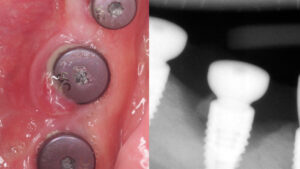
Poor Healing around a dental implant in a patient with very high stress lifestyle
Oral surgery is a common procedure that can greatly improve a person’s dental health and overall well-being. However, many individuals are unaware of the significant role that stress can play in the healing process following such surgeries. Stress, both psychological and physiological, has been shown to have a profound impact on the body’s ability to heal. Over the last 25 years of my practice, we have treated thousands of patients for wisdom teeth extractions, dental implants, bone grafting, and other common procedures in oral surgery. It has been our consistent observation that patients in constant state of stress heal poorly and experience more complications than those without stress or anxiety. In a previous blog addressing the question “How long will my dental implants last”, we addressed stress as one of the high risk factors in longevity of implants.
The Connection between Stress and Healing:
Stress triggers a series of physiological responses in the body, including the release of stress hormones such as cortisol and adrenaline. While these responses are beneficial in acute situations, prolonged or chronic stress can disrupt the delicate balance required for effective healing. Several mechanisms contribute to the negative effects of stress on the healing process after oral surgery.
- Delayed Wound Healing: Stress can impair the body’s ability to heal wounds by prolonging the inflammatory phase. Elevated levels of stress hormones can suppress the immune system, leading to increased inflammation and delayed wound closure. This delay in healing can increase the risk of complications, such as infection or prolonged pain, following oral surgery.
- Altered Immune Response: Chronic stress weakens the immune system, making it less effective in fighting off infections. This can leave the surgical site vulnerable to bacterial colonization and increase the likelihood of post-operative complications. Additionally, stress-related immune system dysregulation can impair the body’s ability to clear away dead cells and debris, hindering the formation of new tissue.
- Increased Pain Perception: Stress has been shown to amplify pain perception. Patients experiencing high levels of stress tend to report higher levels of pain following oral surgery. Heightened pain sensitivity can lead to difficulties in managing post-operative discomfort, affecting the patient’s overall well-being and quality of life during the healing period.
Managing Stress for Optimal Healing:
Recognizing the impact of stress on the healing process, it is crucial to implement strategies that can help manage stress levels and promote optimal recovery after oral surgery. Consider the following approaches:
- Communication and Education: Ensure open and clear communication between the patient and the oral surgeon regarding the surgical procedure, post-operative care instructions, and potential risks. Providing patients with comprehensive information can alleviate anxiety and reduce stress levels.
- Relaxation Techniques: Encourage patients to practice relaxation techniques such as deep breathing, meditation, or guided imagery. These techniques have been shown to lower stress hormone levels and promote a sense of calm and well-being.
- Support System: Encourage patients to lean on their support systems, whether it be family, friends, or support groups. Having a strong network of individuals who can provide emotional support can help alleviate stress and improve the healing process.
- Healthy Lifestyle Choices: Promote a healthy lifestyle, including a balanced diet, regular exercise, and adequate sleep. These factors contribute to overall well-being and can help reduce stress levels.
- Professional Support: In some cases, stress management techniques may not be sufficient, and professional support may be necessary. Encourage patients to seek guidance from mental health professionals who can provide coping strategies and support throughout the healing process.
Stress exerts a profound influence on the healing process after oral surgery, potentially leading to delayed wound healing, altered immune responses, and increased pain perception. By recognizing the impact of stress and implementing strategies to manage it effectively, patients can enhance their healing experience, minimize complications, and promote optimal recovery. Oral surgeons and healthcare providers should prioritize addressing stress as an integral part of the overall care provided to patients undergoing oral surgery.
Here are several references in the literature:
- Nascimento GG, Leite FR, Do LG, et al. Is there a relationship between stress, cortisol, and periodontitis? A systematic review. J Periodontol. 2018;89(4):E91-E102. doi:10.1002/JPER.17-0539
- Khadivzadeh T, Poursadeghiyan M, Abadi ADN, et al. The effect of psychological stress on healing of extraction wounds in rats. J Dent Res Dent Clin Dent Prospects. 2017;11(3):178-183. doi:10.15171/joddd.2017.032
- Beumer J 3rd, Curtis TA, Firtell DN. Maxillary and mandibular stress during and after rigid fixation. J Oral Maxillofac Surg. 1987;45(5):417-420. doi:10.1016/0278-2391(87)90478-3
- Mohajerani H, Anderson C, Badner VM, et al. The effect of stress on the healing of maxillary bone grafts. J Oral Maxillofac Surg. 2009;67(10):2174-2179. doi:10.1016/j.joms.2009.03.031
- Pinheiro ET, Medeiros AM, Fontes ST, et al. The impact of stress on the development of medication-related osteonecrosis of the jaws: a retrospective case-control study. J Oral Maxillofac Surg. 2020;78(12):2224-2232. doi:10.1016/j.joms.2020.06.006
- Thomas PT, Gopinath D, Kandasamy B, et al. Role of stress in maxillofacial wound healing: A comparative study. J Pharm Bioallied Sci. 2019;11(Suppl 2):S354-S359. doi:10.4103/JPBS.JPBS_20_19
Dr. H. Ryan Kazemi is a board-certified oral and maxillofacial surgery in Bethesda, MD